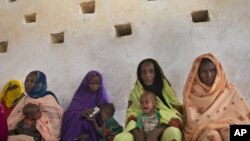The executive director of the United Nations World Food Program says the international community "cannot and must not ignore" deepening food shortages in Niger, which are being aggravated by thousands of refugees fleeing fighting in northern Mali.
The WFP chief, accompanied by the head of the U.N. refugee agency, wraps up a three-day visit to Niger Monday, as up to 15 million people face hunger and starvation across the Sahel this year.
WFP' Executive Director Ertharin Cousin says urgent funding is needed to continue emergency assistance to four million people in Niger who do not have enough to eat.
Cousin said she saw firsthand this past weekend how precarious the situation has become, especially for young children and pregnant or breastfeeding mothers.
"In those areas where WFP has an early blanket feeding program, we're seeing healthy babies and healthy mothers who can breastfeed their babies. But in those areas where we have not yet extended our program, we are seeing mothers feeding their children things like wild leaves and berries that if they don't boil them six times are toxic for their children," said Cousin.
Cousin said poor rainfall and a failed harvest mean that the lean season, which usually starts in June, is already well underway for many families.
Niger sits at the heart of a drought-ridden band of territory stretching from Senegal to Eritrea called the Sahel. This is third food crisis to hit the region in less than a decade. Aid workers say many of those affected by this year's food shortages have not recovered from the last crisis in 2010.
Humanitarian agencies have been sounding the alarm since the start of the year, but say they have still only received a fraction of the necessary funds.
WFP's Cousin said this year's crisis in Niger is "even more complicated" than it has ever been in the past. "What you have is communities that are suffering from a failed harvest, so there is nothing in some markets. Where there is food in markets, because of high food prices, they can't afford it so they have no access," she said. "And, then you have the refugees coming into Niger. At this point, we've seen about 35,000 refugees come from Mali into Niger and when I was there yesterday, another busload arrived."
Refugees fleeing violence and instability in northern Mali have been crossing into Niger by the thousands since fighting began in January. Many of them ended up in border villages already low on food.
Cousin said the international community has less than a month to invest in aid before the lean season really gets underway. She said WFP has prepositioned food and supplies but still lacks the resources to distribute them in all areas.
The WFP estimates it needs an additional $450 million to help people at risk across the Sahel.
The WFP chief, accompanied by the head of the U.N. refugee agency, wraps up a three-day visit to Niger Monday, as up to 15 million people face hunger and starvation across the Sahel this year.
WFP' Executive Director Ertharin Cousin says urgent funding is needed to continue emergency assistance to four million people in Niger who do not have enough to eat.
Cousin said she saw firsthand this past weekend how precarious the situation has become, especially for young children and pregnant or breastfeeding mothers.
"In those areas where WFP has an early blanket feeding program, we're seeing healthy babies and healthy mothers who can breastfeed their babies. But in those areas where we have not yet extended our program, we are seeing mothers feeding their children things like wild leaves and berries that if they don't boil them six times are toxic for their children," said Cousin.
Cousin said poor rainfall and a failed harvest mean that the lean season, which usually starts in June, is already well underway for many families.
Niger sits at the heart of a drought-ridden band of territory stretching from Senegal to Eritrea called the Sahel. This is third food crisis to hit the region in less than a decade. Aid workers say many of those affected by this year's food shortages have not recovered from the last crisis in 2010.
Humanitarian agencies have been sounding the alarm since the start of the year, but say they have still only received a fraction of the necessary funds.
WFP's Cousin said this year's crisis in Niger is "even more complicated" than it has ever been in the past. "What you have is communities that are suffering from a failed harvest, so there is nothing in some markets. Where there is food in markets, because of high food prices, they can't afford it so they have no access," she said. "And, then you have the refugees coming into Niger. At this point, we've seen about 35,000 refugees come from Mali into Niger and when I was there yesterday, another busload arrived."
Refugees fleeing violence and instability in northern Mali have been crossing into Niger by the thousands since fighting began in January. Many of them ended up in border villages already low on food.
Cousin said the international community has less than a month to invest in aid before the lean season really gets underway. She said WFP has prepositioned food and supplies but still lacks the resources to distribute them in all areas.
The WFP estimates it needs an additional $450 million to help people at risk across the Sahel.




